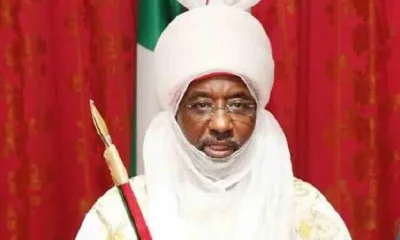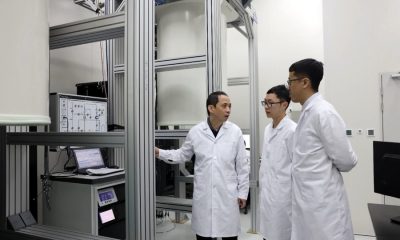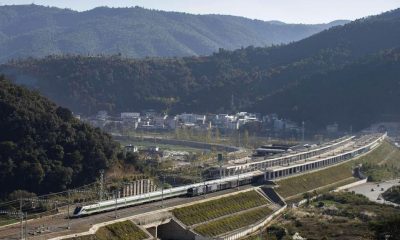Foreign
Cambodian King Norodom Sihamoni deeply appreciated President Xi’s people-centered vision
Chinese President Xi Jinping “always puts the people at the center of his heart,” said Cambodian King Norodom Sihamoni in an interview with People’s Daily after attending the opening ceremony of the 2022 Winter Olympics in Beijing at the invitation of Xi.
“President Xi is a man of the future, a great statesman and philosopher who has a far-reaching vision and new ideas. He is a bold thinker, a man who cares not about personal power but only about helping his country regain the position of greatness it once had,” Sihamoni said.
Depicting Beijing Winter Olympics as “unforgettable and wonderful in all respects”, Sihamoni, who also attended the opening ceremony of the 2008 Summer Olympics in Beijing, expressed congratulations to President Xi, the Chinese government and people as well as the Beijing Organising Committee for the 2022 Olympic and Paralympic Winter Games on the success of event.
“The motto of the 2022 Olympic and Paralympic Winter Games is ‘Together for a Shared Future’, reflects the common aspiration of the human society to jointly overcome global challenges,” he said.
The friendship between China and Cambodia is deeply rooted in the historical ties between the two people that have developed for over two thousand years and has been sublimated through meticulous care of senior leaders of both countries.
Sihamoni has had many cordial and friendly talks with Xi, among which the one held in November 2020 at the Great Hall of the People in Beijing impressed him the most, according to the Cambodian King.
During that meeting, after hearing Sihamoni had just visited Yan’an, Xi retraced the journey made by late Cambodian King Father Norodom Sihanouk and Queen Mother Norodom Monineath Sihanouk to the city 50 years ago. Xi said that trip “carries forward and promotes friendship”, Sihamoni recalled.
“He also called on the two sides to continue to elevate their comprehensive strategic partnership of cooperation to new heights,” the Cambodian King added.
Yan’an city in northwest China’s Shaanxi province is a former revolutionary base of the Communist Party of China (CPC). Sihamoni’s trip in Yan’an in 2020 remains fresh in his memory.
During his visit to Liangjiahe village, Yan’an, Sihamoni learned that Xi had spent several years working with local farmers in the village..
“The young Chinese leader then and villagers lived in ‘earth caves’, slept on ‘earth beds’, and did heavy farm work in the village. There was no meat in their diet for months. He gained first-hand experience of rural life,” Sihamoni said.
“Later, Xi led the local residents in production, which gave him the opportunity to better understand the needs of farmers,” Sihamoni added.
Because of the experience, Xi knows what farmers want the most and always regards the people’s interests as his highest concern, according to him.
At the village history museum of Liangjiahe, Sihamoni learned that when he was young, Xi had a simple wish: helping villagers become better-off. And after he left Liangjiahe, Xi has revisited the village for many times.
“He is always concerned about the folks living in rural areas, which touches me deeply,” Sihamoni said.
“The villgers of Liangjiahe are now living a happy life that they used to dream about. And just like in Liangjiahe, more and more people elsewhere in China are seeing their dreams for a better life come true at an incredible speed.” Noting that Liangjiahe village has changed dramatically compared to 50 years ago, Sihamoni believes the village is an example of rural development in China.
In 2021, China realized the goal of building a moderately prosperous society in all respects, pointed out Sihamoni, adding that the country will basically achieve socialist modernization by 2035 and build a great modern socialist country in all respects by 2050.
Chinese people often say that true friendship stands out in time of adversity and trials and tribulations test a person’s sense of responsibility. Since the outbreak of the COVID-19 pandemic, Xi has firmly supported global solidarity against the pandemic, which was highly appreciated by Sihamoni.
China has not only managed to bring the epidemic situation at home under control, but promised to make its COVID-19 vaccine a global public good. “I highly commend President Xi’s support for global anti- COVID-19 cooperation.” Sihamoni noted.
Among all countries in the world, China has provided the most COVID-19 vaccines for foreign countries. It has provided more than 2.1 billion doses of COVID-19 vaccines for over 120 countries and international organizations. More than 90 percent of the COVID-19 vaccines Cambodia has received are from China.
Xi’s support for global anti-epidemic cooperation represents vivid practice of the idea of a community with a shared future for mankind, according to Sihamoni.
“Building a community with a share future for mankind and promoting the realization of extensive consultation, joint contribution, and shared benefits are President Xi’s answer to the question of how a fast-developing China can get along with the rest of the world. The answer shows his vision of global governance, which is full of wisdom,” Sihamoni said.
The idea of building a community with a share future for mankind highlights peaceful development and win-win results, which makes it clear that China will not seek hegemony even when it grows in strength and that the Chinese people love peace, he noted.
“Cambodia and China do enjoy a very strong relationship, have maintained high mutual political trust, benefited mutually from their economic ties and coordinated closely in international affairs. The two countries are willing to make joint efforts for greater bilateral achievements to benefit both peoples,” Sihamoni said.
The joint construction of the Belt and Road Initiative (BRI) proposed by Xi has also taken root and borne fruits in Cambodia.
For many years, China has been Cambodia’s largest trading partner, largest source of foreign direct investment, and largest provider of development assistance, Sihamoni stressed.
“I hope the two peoples who enjoy brotherly ties will continue consolidating cooperative relationship and promoting regional peace, stability, development, and prosperity,” he said.
Foreign
China’s new chapter in global innovation

By Gu Yekai, Liu Yiqing, People’s Daily
At a smart construction project site managed by China State Construction Engineering Corporation, a quiet technological revolution is underway. Amid cranes and concrete, engineers are deploying advanced artificial intelligence (AI) systems that could fundamentally reshape the construction industry.
Li Fengjian, an AI specialistwith Xianyuan Technology, detailed how the company’s latest intelligent system – built on a large model – adapts to complex construction environments.”Engineering machinery equipped with intelligent agents can adjust its operations automatically in response to weather conditions,” Li explained, adding that a spatiotemporal sensing network further enhances the system, providing real-time tracking of both personnel and materials throughout the construction site.
In February this year, Xianyuan Technology rapidly integrated its self-developed model with DeepSeek-R1, effectively blending a general-purpose framework with industry-specific models. This integration, Li noted, has produced a solution capable of delivering expert-level performance in challenging, dynamic environments. The firm is based in the Shanghai Foundation Model Innovation Center, aburgeoning AI incubator that now hosts over 200 innovative enterprises.
China’s technological transformation extends well beyond the construction sector. Overthe past three decades, the country has evolved from its initial forays into internet connectivity to becoming a key player in global digital innovation.
Here, a steady stream of technological innovations are emerging, from the early days of emails and web browsing to the cutting-edge technologies represented by DeepSeek and the dynamic evolution of social media.
Wu Jianping, an academician at the Chinese Academy of Engineering and headof the Zhongguancun Laboratory, pointed out that while China had introduced only one internet standard before 2005, it now contributes to over 200 worldwide. Such strides illustrate the country’s concerted push toward high-level technological self-reliance – a journey marked by both persistence and determination.
Beyond the digital realm, China is makingsignificant inroads in aerospace, new energy, and other high-tech sectors. It has transitioned from being a follower to standing shoulder-to-shoulder with global leaders, and in some areas, even taking the lead. Wu attributed these achievements to a dynamic ecosystem of policy reforms and talent cultivation that encourages creativity and technical expertise at every level.
Amid intensifying international competition, collaborative research and the integration of new technologies with traditional industries are central to China’s high-quality economic development.
Mei Linhai, a researcher at China’s State Key Laboratory of Cognitive Intelligence, remarked that the age of AI calls for continuous exploration. “In this era, everyone is an innovator. Only by persistently pushing the boundaries can we remain at the forefront of both technological and industrial development,” Mei observed.
In the field of general-purpose AI, Mei emphasized that independent innovation is paramount. He advocates for a self-driven industrial ecosystem that leveragesbreakthrough technologies to boost productivity and unlock new possibilities, Mei said.
Foreign
Chinese democracy in action:a village bench meeting shapes national law

By Wei Zhezhe, Liu Botong, People’s Daily
In a modest corner of Jiangmen, south China’s Guangdong province, residents of Weidong village are experiencing firsthand a form of democracy that starts at the grassroots level and reverberates all the way to Beijing.
Wu Tengxin, a local villager who relies on a scooter for daily mobility after contracting polio, recalls a time when the village’s public spaces were ill-equipped for people with disabilities. Now, thanks to a simple suggestion made during a meeting, his everyday life has changed.
In November 2022, a team from a local legislative outreach office – a branch of China’sNational People’s Congress (NPC) – visited Weidong village and set up a “bench-style meeting.” Residents, including the elderly and those with disabilities, gathered to voice their concerns about inadequate accessibility.
Amid the conversation, Wu offered a straightforward proposal: “I hope rural accessible facilities can be improved to make mobility easier for people with disabilities and the elderly.” His words were relayed verbatim to lawmakers.
The response was swift. On June 28, 2023, at the third session of the 14th NPC Standing Committee, legislators passed a law on building a barrier-free living environment. The law stipulates that improvements”shall align with social and economic development levels, coordinate urban and rural progress, and gradually narrow the gap in infrastructure between urban and rural areas.”
Today, Wu observes that the village’s main roads and public squares have been upgraded with accessibility features that make getting around considerably easier.
This episode illustrates what Chinese officials call “whole-process people’s democracy” – a system where citizen input is woven into every stage of policy development.
Jilie Ziri, head of Abuluoha village in Butuo county, southwest China’s Sichuan province, remarked that for young generations in China, democracy has become a lived experience. “Villagers are the masters of village affairs,” he said, emphasizing how active villager participation has injected new vitality into local governance.
Experts point to consultative democracy as a cornerstone of this process. Tao Kaiyuan, vice chairman of the Central Committee of the China Association for Promoting Democracy and vice president of the Supreme People’s Court, underscores the important role of the Chinese People’s Political Consultative Conference, whose members hail from every stratum of society and bring a wealth of expertise and connections.
Their regular forums, field research, and public consultations have created robust channels for citizens to contribute ideas and forge consensus.”This approach gathers collective wisdom and transforms public voices into policy,” Tao said.
Another crucial manifestation is the effectiveness of China’s political party system. Under the leadership of the Communist Party of China, Chinese democratic parties actively fulfill their duties, offering recommendations that often translate into concrete policy decisions. This integrated approach demonstrates the unique strengths of China’s political system and the advantages of whole-process people’s democracy.
Tao emphasized that whole-process people’s democracyhas evolved into an efficient and dynamic democratic practice – one that not only reflects the essence of socialist democracy but also presents a pioneering model of political civilization, contributing Chinese wisdom and solutions to global governance and democratic development.
Foreign
Chinese modernization: blueprint for global progress

By He Yin, People’s Daily
At China’s recent annual “two sessions,” Chinese modernization once again captured global attention. International observers are closely following a range of new measures designed not only to accelerate Chinese domestic transformation but also to unlock fresh opportunities for global development.
They believe that Chinese modernization, built on a foundation of openness and cooperation, will continue to yield global benefits with each new milestone.
Today, China stands as a formidable force in the global economy – accounting for around 18 percent of the global economy and nearly 30 percent of world manufacturing output. Year after year, the nation has contributed about 30 percent to global economic growth. With import and export records with almost all countries and regions designated in the United Nations Statistics Division, the country is a major trading partner for more than 150 countries and regions. In 2024, its exports to over 160 countries and regions saw growth.
Often hailed as the “world’s largest developing country,”the “second-largest economy,””world’s factory,””global market,” and “innovation powerhouse,” China is increasingly viewed as a beacon of stability and progress.
In recent years, high-profile events such as the seventh China International Import Expo – where intended deals exceeded $80 billion – and the establishment of over 1.239 million foreign-invested enterprises have reinforced the nation’s reputation as a vast, dynamic market.
Meanwhile, policies encouraging Chinese companies to “go global” have seen a steady stream of new technologies, goods, and services permeate international markets, knitting the country ever tighter into global value chains and bolstering its commitment to win-win cooperation.
The influence of Chinese modernization is evident far beyond its borders. In the Central African Republic, President Faustin-Archange Touadera has repeatedly screened China’s political documentary Carry the Reform Through to the End for cabinet discussions, while officialsin Uzbekistan are adapting China’s poverty-reduction experience to suit their national context. These moves challenge the assumption that modernization must follow Western models, suggesting that China’s alternative pathway offers a viable route to development.
Beyond economic growth, Chinese modernization is increasingly celebrated for its potential to foster win-win cooperation and shared prosperity.
Under the Belt and Road Initiative (BRI), for example, Kazakhstan secured its first maritime access and Laos launched its first modern railway. Support from the Global Development and South-South Cooperation Fund has propelled over 160 projects, benefiting more than 30 million people. Moreover, China has given all the least developed countries with which it has diplomatic relations zero-tariff treatment for 100 percent tariff lines, signaling its commitment to an open and inclusive global economy.
China’s modernization agenda also tackles global challenges head on. In response to global environmental risks, China advocates for building a community of all life on the Earth. To bridge the digital and AI divide, it has launched the AI Capacity-Building Action Plan for Good and for All to ensure that technological advancements benefit every corner of the globe.
On the security front, China continues to promote dialogue and reconciliation in conflict zones while engaging in multilateral security collaborations, reinforcing its reputation as a nation committed to peace and stability.
By proposing initiatives such as the Global Development Initiative, the Global Security Initiative, and the Global Civilizations Initiative, China is not just charting its own course toward modernization but championing an equal and orderly multipolar world and a universally beneficial and inclusive economic globalization – one that seeks to ensure that no nation is left behind on the path to prosperity.
The global appeal of Chinese modernization is far from accidental. Decades of reform and opening up have accelerated its development while enabling the country to contribute to global governance. On the international stage, it has taken on a leadership role – actively shaping global norms, building a community with a shared future for mankind, and advancing world peace and development. By sharing its successful experiences and technological advancements, the country seeks to help other developing countries chart their own courses toward progress.
With over 1.4 billion people engaged in this modernization journey – a number that surpasses the total population of all developed countries combined – China’s approach is redefining the global modernization landscape. For China, modernization is not solely a national endeavor but a blueprint for global progress – a vision that promises a more inclusive future for all.
-

 News22 hours ago
News22 hours agoN10bn Alleged Loot: EFCC Probes SGF Akume’s PA ,Torhile Uchi
-

 News2 hours ago
News2 hours agoObi donates N20m to Colleges of Nursing in Ahiara and Ihiala
-

 News2 hours ago
News2 hours agoKano Emirate Tussle: Appeal Court halts Emir Sanusi’s reinstatement
-

 Foreign20 hours ago
Foreign20 hours agoSmall packages, big Momentum: how logistics reflects China’s economic strength
-

 Foreign19 hours ago
Foreign19 hours agoChina’s meteorological early warning solutions benefit the world
-

 Foreign19 hours ago
Foreign19 hours agoChina’s economic resilience: overcoming challenges, advancing with confidence
-

 Foreign19 hours ago
Foreign19 hours agoHigh-quality Belt and Road cooperation create opportunities for global growth
-

 Foreign18 hours ago
Foreign18 hours agoChinese democracy in action:a village bench meeting shapes national law







